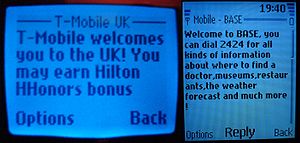| English: Author: Redvers. Two "welcome" messages received via SMS text messaging. T-Mobile welcomes Proximus to the United Kingdom; BASE welcomes Orange subscribers to Belgium. Both are Nokia phones, but the picture was taken with another brand of mobile phone camera. (Photo credit: Wikipedia) |
Here are a few reasons why SMS text mobile marketing is vital to your business or organization.
1. You Can Reach More People Than With ANY Other Method
Did you know...
- 6% of Americans have a Twitter account
- 33% of Americans have a Facebook account (more than 50% of males do NOT check their Facebook daily)
- 37% of Americans actively use email
- 92% of Americans have a cell phone (98% of which have SMS enabled handsets!)
In fact, believe it or not there are 2.5 times as many users of "texting" than email. But that's not even the most important point. You see, 33% of email addresses change on a yearly basis. Your email database gets more and more outdated with each passing day. But with phone number portability and the popularity of mobile phones, people are ditching their home phones and keeping their cell phones for life. That means your contact database will continue to grow - and almost never get old!
2. More of the People Who Receive Your Message Will Actually Read It!
- With text marketing your SMS reminders, notifications, or coupons are received at the exact time your customers need to see them-and often at the precise time they are making a buying decision.
- Consider this incredible fact: 95% of all text messages are read within 5 minutes of delivery, with an overall read-rate of 97%!
- Compared with other forms of marketing and communication, mobile is the clear winner...
3. More of the People Who Read Your Message Will Actually Take Action
Reaching more people wouldn't mean much if it didn't have any effect on their actions. But perhaps the best news of all regarding text marketing is that it actually does drive behavior. According to research done by the Direct Marketing Association, 70% of recipients react to SMS (text) marketing messages, compared to just 20% for email. And the same study shows that up to 30% of users redeem mobile offers, compared to 5% for email.
Consider this...
- 94% of consumers who receive a mobile marketing offer recall the specific call-to-action (Hip Cricket Research)
- 15% of consumers admit to increasing what they spent toward a specific brand based on mobile marketing (eMarketer)
- User response to a mobile ad is often 10 times higher than a computer/email offer (Quantcast Data)
- 33% of Americans acknowledged using a mobile coupon received via text marketing within the past month (eMarketer)
In fact, according to ABI Research, the average ROI with mobile marketing is $10 for every $1 spent!
4. Your Customers and Members Actually Want to Hear from You
The most valuable piece of your business is not your building or your computers or some specialized piece of equipment. It is your customer database.
Text marketing allows you to build and nurture your customer database so that they will have more loyalty to you and ultimately do business with you more often. And the best part is, they WANT to hear from you more often. DMA research shows that the vast majority of consumers not only want to receive special offers and information by text, but that they wish more businesses and organizations offered this option! Likewise, Nielsen Mobile discovered that 70% of consumers they surveyed are happy to receive promotional information via text message.
The true power of mobile marketing is that your customers are "opting in" to receive your information. By texting your keyword to your shortcode they are telling you they want to hear from you. There is no better way to build an ongoing (and profitable) relationship with your most valuable asset-your customer.
5. Text Marketing Will Save You Time and Money
If you are a for-profit business, there is no denying that text marketing can increase your sales. But even if you are not trying to sell anything, Text marketing can help your bottom line.
Text marketing can replace many costly and time-consuming tasks for much, much less. Paying employees to call your entire list when you have to cancel an event or a game? Text marketing can do the job a whole lot better, faster and cheaper. Mailing postcards and placing ads to promote a concert or meeting? Text marketing will get the message across instantly at the touch of a button. And because people read their texts, you'll reach a greater percentage of your audience with your information! You can even include a direct link to a phone number, email address or web site so that recipients can contact you instantly.
There's never been a win-win quite like SMS text marketing. And for less than $2/day you can put this powerful tool to work for you immediately. In just 5 minutes you can be up and running with your own account and custom keyword.
Article Source:
http://EzineArticles.com/7309566

















